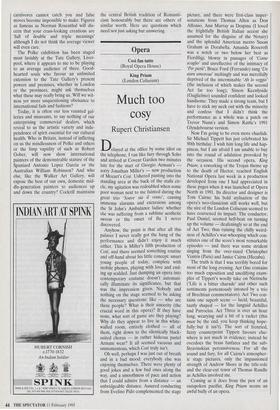Opera
Cosi fan tutte (Royal Opera House) King Priam (London Coliseum)
Much too cosy
Rupert Christiansen
Delayed at the office by some idiot on the telephone, I ran like fury through Soho and arrived at Covent Garden two minutes late for the start of Giorgio Armani's sorry Jonathan Miller's — new production of Mozart's Cosi. Ushered panting into the standing area at the back of the stalls cir- cle, my agitation was redoubled when some poor woman next to me fainted during the great trio `Soave sia it vento', causing immense alarums and excursions among the St John's Ambulance ladies: whether she was suffering from a sublime aesthetic swoon or the onset of flu I never discovered.
Anyhow, the point is that after all this palaver I never really got the hang of the performance and didn't enjoy it much either. This is Miller's fifth production of Cosi, and there seemed something routine and off-hand about his little concept: smart young people of today, complete with mobile phones, playing with love and end- ing up scalded. Just dumping an opera into contemporary costume doesn't automati- cally illuminate its significance, but that was the impression given. Nobody and nothing on the stage seemed to be asking the necessary questions: like — who are these people? What is their sincerity (the crucial word in this opera)? If they have none, what sort of game are they playing? Why do they appear to live in this white- walled room, entirely clothed — all of them, right down to the identically black- suited chorus — in rather hideous pastel Armani wear? It all seemed vacuous and unmomentous, which Cosi truly isn't.
Oh well, perhaps I was just out of breath and in a bad mood: everybody else was enjoying themselves. There were plenty of good jokes and a few bad ones along the way, and a smoothness of pace and action that I could admire from a distance — an unbridgeable distance. Assured conducting from Evelino Pido complemented the stage picture, and there were first-class imper- sonations from Thomas Allen as Don Alfonso, Ann Murray as Despina (I loved the frightfully British Italian accent she assumed for the disguise of the Notary) and the splendid American mezzo Susan Graham as Dorabella. Amanda Roocroft was a notch or two below her best as Fiordiligi, blowsy in passages of 'Come scoglio' and unreflective of the intimacy of `Per pieta% Bruce Ford (Ferrando) sang `LIn aura amorosa' meltingly and was mercifully deprived of the interminable Ah lo veggio' (the inclusion of which makes the second Act far too long); Simon Keenlyside (Guglielmo) sounded confident and looked handsome. They made a strong team, but I have to stick my neck out with the minority and confess that I didn't think the performance as a whole was a patch on Trevor Nunn's and Simon Rattle's 1991 Glyndebourne version.
Now I'm going to be even more churlish. Sir Michael Tippett has just celebrated his 90th birthday. I wish him long life and hap- piness, but I am afraid I am unable to buy into the round of adulation provoked by the occasion. His second opera, King Priam, a reworking of the Trojan theme up to the death of Hector, reached English National Opera last week in a production developed from one I had appreciated in these pages when it was launched at Opera North in 1991. Its director and designer is Tom Cairns: his bold stylisation of the opera's neo-classicism still works well, but the size of the London Coliseum seemed to have coarsened its impact. The conductor, Paul Daniel, seemed hell-bent on turning up the volume — deafeningly so at the end of Act Two, thus ruining the chilly weird- ness of Achilles's war-whooping which con- stitutes one of the score's most remarkable episodes — and there was some strident singing from the over-taxed Christopher Ventris (Paris) and Janice Cairns (Hecuba).
The truth is that I was terribly bored for most of the long evening. Act One contains too much exposition and unedifying exam- ples of Tippett's woolly take on Nietzsche (`Life is a bitter charade' and other such sentiments portentously intoned by a trio of Brechtian commentators). Act Two con- tains one superb scene — lucid, beautiful, tautly shaped — for the languid Achilles and Patroclus. Act Three is over an hour long, wearying and a bit of a racket (this must be the end, you keep thinking hope- fully: but it isn't). The sort of frenzied, fuzzy counterpoint Tippett favours else- where is not much in evidence; instead he overdoes the brass fanfares and the sub- Stravinskian percussiveness. For all the sound and fury, for all Cairns's atmospher- ic stage pictures, only the impassioned strength of Andrew Shore in the title-role and the clear-cut tenor of Thomas Randle as Achilles involved me.
Coming as it does from the pen of an outspoken pacifist, King Priam seems an awful bully of an opera.


























































 Previous page
Previous page